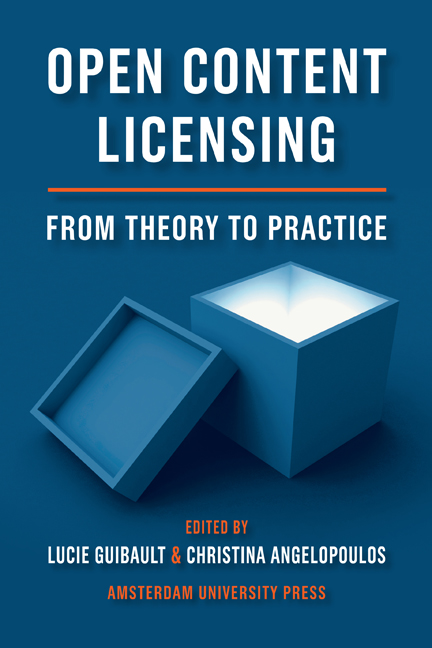Book contents
- Frontmatter
- Contents
- 1 Open Content Licensing: From Theory to Practice – An Introduction
- 2 Towards a New Social Contract: Free-Licensing into the Knowledge Commons
- 3 Is Open Content a Victim of its Own Success? Some Economic Thoughts on the Standardization of Licenses
- 4 (Re)introducing Formalities in Copyright as a Strategy for the Public Domain
- 5 User-Related Assets and Drawbacks of Open Content Licensing
- 6 Owning the Right to Open Up Access to Scientific Publications
- 7 Friends or Foes? Creative Commons, Freedom of Information Law and the European Union Framework for Reuse of Public Sector Information
- 8 Contributing to Conversational Copyright: Creative Commons Licenses and Cultural Heritage Institutions
- 9 Creative Commons and Related Rights in Sound Recordings: Are the Two Systems Compatible?
8 - Contributing to Conversational Copyright: Creative Commons Licenses and Cultural Heritage Institutions
Published online by Cambridge University Press: 22 January 2021
- Frontmatter
- Contents
- 1 Open Content Licensing: From Theory to Practice – An Introduction
- 2 Towards a New Social Contract: Free-Licensing into the Knowledge Commons
- 3 Is Open Content a Victim of its Own Success? Some Economic Thoughts on the Standardization of Licenses
- 4 (Re)introducing Formalities in Copyright as a Strategy for the Public Domain
- 5 User-Related Assets and Drawbacks of Open Content Licensing
- 6 Owning the Right to Open Up Access to Scientific Publications
- 7 Friends or Foes? Creative Commons, Freedom of Information Law and the European Union Framework for Reuse of Public Sector Information
- 8 Contributing to Conversational Copyright: Creative Commons Licenses and Cultural Heritage Institutions
- 9 Creative Commons and Related Rights in Sound Recordings: Are the Two Systems Compatible?
Summary
Introduction
Culture, Communities and Copyright
The curatorship of cultural works and ensuring their availability has historically been a core task of cultural heritage institutions. Facilitating user involvement is essential to this task. From a user's perspective, if participation in cultural activities on the internet is to be promoted, it is of great importance to secure both access to works and the right to reuse them. In online communities, users become authors in their own right. Yet the consequences of this development have, for a large part, not yet been translated into policy on the access and reuse of digital cultural heritage. The Dutch Council for Culture describes this as follows:
Technological developments together with socio-economic and cultural trends lead to other forms of cultural participation. Because of the lack of institutionalised and traditional structures, people are more and more creating their ‘own’ communities, within which they seek appropriate forms of communication. Furthermore, consumers of information and culture are increasingly becoming active producers and developers of culture.
The Council mentions the basic argument that everything created by public means must be and remain accessible to the public. This ‘public funding’ argument might influence the availability of digital cultural heritage in the long run, but, for a large part, cultural heritage institutions are not the rights holders of the works they want to digitize. The Council has pointed to the possible use of Creative Commons (CC) licenses for such material and has announced future research into changing attitudes towards copyright and the public domain.
This chapter hopes to contribute to that research while simultaneously building on existing studies into self-regulation. Self-regulation takes place when rules in a domain are made, implemented and enforced by direct stakeholders or organizations working on their behalf. In an alternative form of regulation that integrates aspects of bottom-up self-regulation and top-down state regulation, communication between all stakeholders on attitudes and perspectives is crucial. Commitment by citizens can only be expected when state regulation and the involvement of institutional stakeholders enables an open and transparent deliberation of all interests involved. This principle of reciprocity is useful in furthering an understanding of copyright as a tool for communication between creators and the public and the possible use of technology to support free culture on the internet.
- Type
- Chapter
- Information
- Open Content LicensingFrom Theory to Practice, pp. 203 - 242Publisher: Amsterdam University PressPrint publication year: 2012
- 2
- Cited by



